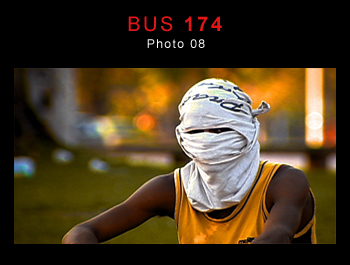Bus 174
Bus 174 
tells the unbelievable story of a crime gone wrong in downtown Rio de Janeiro, where a robbery quickly went to hell and turned into a hijacking of a city bus, and when the police ineffectually responded to the problem the Brazilian media descended on the scene to capture, on super saturated video and in murky TV audio, nearly ever moment of the tragedy from beginning to end.
Bus 174 reaches an impossibly gripping level when directors Felipe Lacerda and Jose Padilha simply let the media footage roll accompanied by recollections of the hostages, who both narrate what is happening on the bus as well as their feelings and emotions about the experience. Mike D’Angelo insightfully calls the film a real-life version of
Dog Day Afternoon, and at its best
Bus 174, for those unfamiliar with the details of the event, invites a level of sweaty-palmed captivation usually reserved for fictional films that are allowed to construct an entire narrative around artificial suspense.
The filmmakers rightfully feel the need to provide a social background to Sandro, the poor robber who got in over his head. Unfortunately the picture
Bus 174 creates of the perpetrator is one filled with clichéd generalities, and it seems clear that the political objective of the film is to showcase Sandro as one of a million similar people living in squalid anonymity until their acquire a media spotlight, breaking out of their poverty through violence. Sandro’s mother was killed in front of him when he was a child;

he hit the streets before he was a teen; he bounced into and out of juvenile incarceration as well as jail many times; and he used a variety of drugs. Lacerda and Padilha devote more than half of their film to building a profile on Sandro but always end up with a description that could easily fit the untold thousands of street kids and young delinquents that plague Brazil. More interesting would be to cut out the background of
Bus 174 and preface the hostage-narrated raw footage of the hijacking with Katie Lund and Fernadno Meirelle’s fictional crime-epic City of God which similarly devotes most of its narrative to the generic creation of youth crime in the ghettos. The dichotomy and intersection of the fiction and the real would provide an incredibly fascinating look at Brazilian youth, but as it is,
Bus 174's sociological investigation is best left to a more broad documentary on the street youth phenomenon of the country, as it does little to deepen or understand the Sandro’s crime.
Dismissing
Bus 174's background as purposely too general is a disservice to this often-fascinating section of the film. When the filmmakers explore Brazilian jails for example, ranging from an immense, packed delinquent center, to a jail so dank and dark the jailer himself pities its inhabitants, and a cell block actually filled with criminals who are allowed to speak on camera, Lacerda and Padilha’s sociological tangents are often interesting and insightful despite their generalities. These tangents are usually more interesting than Sandro’s relatives’ comments, or the film’s consulted sociologist who continually insists on the obvious-that Sandro is an example of the invisible, unwanted aspect of society and that the hijacking revealed it before the eyes of Brazil.
The best moments of the film lie in the media’s coverage of the hostage situation, where we can clearly see Sandro stalking back and forth down the length of the bus, hostage in hand, simultaneously yelling to the hostages and to the police, plagued with a confusion of what to do. He does not want to let the hostages go, he doesn’t

have demands, he doesn’t want to die, he doesn’t want to go to jail; the poor man ended up in a situation that started off bad and became worse and is clearly in over his head. (One of the hostages suggests Sandro was high at the time). The hostages who are willing to talk to the filmmakers reveal many unique things that are unseen by the TV camera, for instance that Sandro keeping up a duel dialog with the people outside the bus and the victims inside, trying to get his hostages to act more desperate and upset so he can try to bluff the police.
Bus 174 is also a statement at the ineptitude of the Brazilian police and SWAT units, who are so unequipped that their commander is forced to use hand signals (instead of radios) to communicate to the unit on the other side of the bus. One is reminded of the incredibly lack of communication in
Bloody Sunday that was a primary cause of the massacre in that film. The fact that
Bus 174's most feverish and interesting moments are in the voyeuristic media coverage may be dismaying for those familiar with the hijacking, as presumably a knowledgeable Brazilian would have seen the footage already and thus the interest in
Bus 174 would be the filmmakers’ investigation to the background of the crime. This aspect, of course, is the most derivative and unhelpful of the film and raises the question that after initial viewing, and thus familiarity with the event, how much does the construction of the film Bus 174 really tell us about the situation. This is assuming that one simply dismisses the film’s documentary background to Sandro and his street life, which should not happen. But the ineffectualness of the filmmakers to explore the event as unique restrains the potential of the material; the only possible way this structure would work would be to conclude the film’s sociological investigation with a number of similar crimes. Portraying just one gives the hijacking a watershed importance that
Bus 174 never really backs up.


0 Comments:
Post a Comment
Subscribe to Post Comments [Atom]
<< Home